Is downtime due to computer overheating affecting production? Tired of paying repair or replacement costs? Armagard examines 4 common causes of computer overheating in industrial environments & provides a solution to combat all four. Put an end to your computer downtime misery…
Has your computer been acting strangely lately, shutting down at random intervals, refusing to boot up or constantly displaying error messages? Then your computer may have a temperature.
If your PC is showing any of these symptoms, computer overheating is the likely cause. It might be time to consider the protection of a NEMA 4 Industrial Enclosure for your PC.
One of the challenges that industrial facilities face is keeping computers cool in tough environments. Perhaps you can relate to this problem, and you’re unsatisfied with the number of ‘how to’ articles that brush it off by telling you to clean your computers, reposition them or change the fans.
Yes, these are all viable answers, and yes they provide a solution in the short-term, but you want a long-term solution that’s less labour intensive and incredibly cost-effective, what if we told you we have the solution?
But first, let’s examine the four most common causes of your computer overheating problem. Don’t worry, we’re going somewhere with this…
The 4 most common causes of computer overheating
(1) In first place… DUST – They say there are two certainties in life, death and tax. We’d like to make the case for a third, dust, it’s inescapable. Dust is the most common cause of computer overheating in industrial environments because it accumulates, blocking vents and disabling fans.
Dust systematically disables your computer by clogging the vents, then smothering all the components of the computer that generate heat. With no extraction point for excess heat, the fan is put into overdrive, overcompensating to cool your PC. Your computer is then left with no defence against heat accumulation.
Then, just when you think that dust has done enough damage, all that excess heat causes your computer to set alight ending any hope of salvaging it.
According to worldwide government reports, it’s estimated that there is up to 50 times more dust present in the air in industrial workplaces. That’s an excess of dust that the common computer is not designed to cope with.
Out of the 4 most common causes for computer overheating, dust is the only one that can prove fatal.
The majority of ‘how to’ articles will give you the ‘quick fix’ solution, advising that you clean your computer.
But, how many businesses do you know have the time to clean their computers, every day, to the standard needed to rid them of all dust in an environment that produces 50 times more of it than the average home? Our guess is you don’t know many…
Trying to clean away dust in an industrial environment is impractical, counterproductive and costly. Here’s why:
- Impractical – To clean a computer properly means they have to be powered down and opened up, hardly practical when trying to run a business that depends on fully operational PCs
- Counterproductive – A DIY computer cleaning campaign means personnel are not doing the job they’re paid to do
- Costly – For the duration of PC downtime your production line may be forced to grind to a halt, resulting in financial losses for every minute you’re out of operation
(2) In second place… A HOT ROOM – Add more heat to equipment that produces heat equals a computer meltdown. It’s recommended that computers operate within the 50oC – 60oC range, but industrial environments exist where temperatures can exceed this range.
Surely this is more deadly than dust! If left exposed to a heat source for an unlimited amount of time, then yes the life of the computer would be ended much quicker.
However, dust is an immovable entity; it cannot be removed from the equation. However, a PC in a hot environment can simply be moved to a cooler room.
Problem solved, right? In terms of keeping your computer alive, yes. But now there’s a question of convenience. Firstly, if moving your PC to a cooler room means traipsing halfway across the facility to access it that’s not good for productivity.
Secondly, if you have an entire PC network operating in a hot room there’s the inconvenience of relocating, a solution that’s costly in terms of downtime and it’s time-consuming.
(3) Third place finisher… POOR POSITIONING – Does your PC sit under a desk? Or, does it rest against a wall in some out of the way place? Computers need space to breathe. If they’re already being choked by dust, or exposed to temperatures more suited to the Caribbean, don’t cut off the respiratory system.
Again, relocation may solve the problem, but there’s obviously a reason that you put your PC in that uncompromising position in the first place. Our guess is convenience…
(4) In fourth… OVERUSE – Putting a computer in an industrial environment, where dust and heat add to the strain, and using it all day constitutes overuse. Computers are not designed to withstand this kind of punishment without protection.
Should your computer survive the demands of the day, it’s not uncommon for the factory to shutdown leaving multiple PCs left on. Running continuously for 24 hours, without respite, there’s no doubt that those computers would be feeling the heat.
Solving the problems
Do you want a solution that solves these problems all at once? That’s where Armagard comes in! The answer to cutting costs, reducing downtime and improving productivity across your industrial facility, can be found in our purpose built, NEMA 4 Industrial Enclosure range.
We provide you with next generation computer & printer enclosures designed to endure the rigours of modern industrial facilities. Each unique enclosure can be completely customized to prevent computer overheating.
Offering complete protection against liquid penetration, dust, dirt and heavy impacts, every unit can be equipped with temperature regulating systems that will stop your PC or printer from overheating. You can wall or stand mount your PC wherever you like thanks to our self-sufficient, low-maintenance units.
Check out the Industrial Computer Cabinet, our high capacity solution able to accommodate your PC, monitor, printer and keyboard all at once, providing up to 10 years protection.
If you’re short on space, take a look at Armagard’s Compact All In One Computer Cabinet, providing NEMA 4 industry rated protection for your PC, monitor and keyboard for up to 10 years.
Benefits
Lasting up to 10 years or more, Armagard industrial computer enclosures are the long-term solution for preventing computer overheating. These units do more than just protect PCs and printers, they safeguard your production line so you’re not left counting the cost of downtime or enduring the frustration of being without valuable equipment.
Our products provide a ‘micro-environment’ for your PC, repelling dust, therefore eliminating PC cleaning, which costs you valuable resources or cash. They provide a climate-controlled environment, so you don’t have to worry about computer overheating and they can be used in any environment so you don’t have to uproot your PC network.
The biggest benefit they offer is convenience. Our products are easy to position, easy to clean and require virtually no maintenance so you can get on with running your business operation.
For further assurance, our entire NEMA 4 Industrial Enclosure range is covered by a 5-year warranty for all mechanical parts, a 1-year warranty for all electrical parts and superb after sales support.
Talk to our sales team now for a solution to suit your facility >>> Call 1-866-434-0807 today.






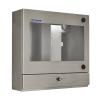
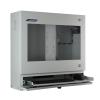
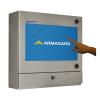
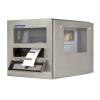
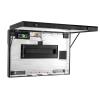
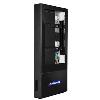
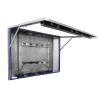
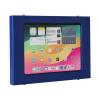
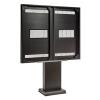
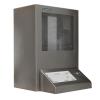






Comments are closed.